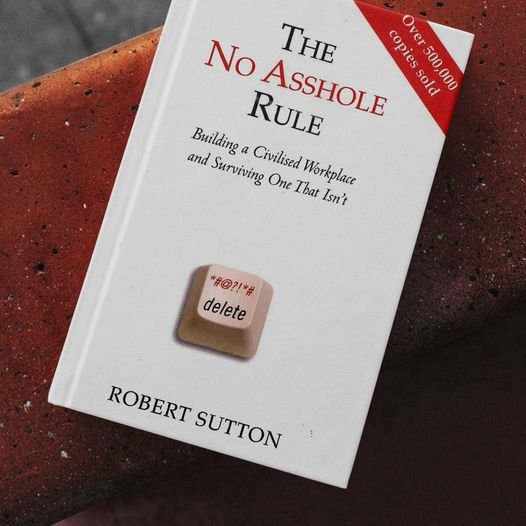🧵
In The No Asshole Rule, Robert I. Sutton presents a compelling case against the destructive impact of toxic behavior in the workplace. The book examines how "assholes," as he labels chronically hostile individuals, harm productivity, morale, and employee well-being. Sutton also provides actionable strategies for identifying, managing, and eliminating these negative behaviors to foster a healthier and more respectful work environment.
Here are key lessons from the book 👇

The Definition of an "Asshole": Sutton characterizes an "asshole" as someone who habitually demeans or belittles others, often through verbal abuse, bullying, or undermining. This focus on recurring behavior emphasizes that the problem lies in ongoing patterns of toxicity rather than occasional incidents.
The Costs of Toxic Behavior: The book underscores both financial and emotional costs associated with toxic individuals. These costs, or "asshole taxes," manifest as decreased productivity, higher employee turnover, and recruitment expenses, creating an environment that drains time and morale.
Emotional Impact on Employees: Sutton explores the toll that toxic behavior takes on employees, who may experience stress, anxiety, burnout, and low job satisfaction. The emotional fallout not only affects individual well-being but also undermines team performance and overall engagement.
The "No Asshole Rule": At the book's core is the concept of a "No Asshole Rule" — a guideline for maintaining a respectful workplace culture by neither hiring nor tolerating individuals with toxic behaviors. Sutton stresses the importance of consistently enforcing this rule to protect and strengthen organizational culture.
Dealing with Toxic Individuals: Sutton provides practical advice for managing toxic colleagues, such as directly addressing harmful behavior, establishing policies that discourage toxicity, and promoting leadership examples that emphasize civility. He encourages employees to limit interactions with toxic individuals whenever feasible.
Self-Reflection and Accountability: Sutton also urges readers to reflect on their own behaviors, noting that everyone can engage in toxic actions at times. Self-awareness and accountability are essential for cultivating a positive workplace dynamic and for personal growth.
The No Asshole Rule is an insightful resource for leaders and employees aiming to build a healthier, more productive workplace. By addressing the harm caused by toxic behavior and suggesting practical solutions, Sutton highlights the critical importance of a respectful, positive environment. Enforcing the "No Asshole Rule" can ultimately lead to higher morale, enhanced collaboration, and organizational success.
Source